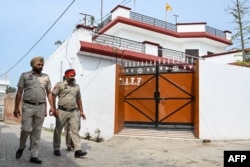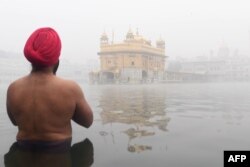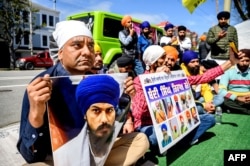Sikh separatist leader Amritpal Singh was little known inside India until a month ago. Now police have launched a massive manhunt for him in India’s northern Punjab state after his calls for an independent Sikh homeland stoked fears of violence in a region that was gripped by a bloody insurgency four decades ago.
The 30-year-old Singh, a self-styled Sikh preacher, catapulted onto the national stage when he and scores of young men brandishing swords and guns stormed a police station in Punjab last month demanding the release of a jailed aide. Police later said they could not beat back the mob because they used the Sikh holy book as shields.
The images of Singh’s armed followers chasing policemen raised concerns that his support could be growing in the farming state, where nearly 60 percent of the population is Sikh.
Thousands of police and paramilitary forces have been searching for Singh since Saturday. More than 150 of his followers have been arrested and internet service has been restricted in the state.
Accused of sowing discord, Singh has been declared a fugitive. Promoting the cause of Khalistan — the name given to an independent Sikh homeland — has been outlawed in India and has little support in Punjab, according to analysts. It remains a rallying cry, though, among some sections of the Sikh diaspora in countries like Britain and Canada.
But the sudden emergence of Singh in Punjab revived chilling memories of the bloody insurgency that led to the death of thousands of people, including top officials in the 1980s and early 1990s. Former Indian Prime Minister Indira Gandhi was assassinated by her Sikh bodyguards in 1984 after she ordered an army operation to flush out militants from the Golden Temple, one of Sikhism’s holiest sites.
Singh, who had moved to Dubai in 2012 to join his family’s transportation business, returned to India last year when he became the leader of a group called Waris Punjab De, or “the heirs of Punjab.” The organization played a role in mobilizing a massive, year-long protest movement by thousands of farmers in 2021 against agricultural reforms introduced by Prime Minister Narendra Modi’s government.
In recent months, Singh led marches calling for protecting the rights of Sikhs against what he called the overreach of Modi’s Hindu nationalist government. He said an independent homeland was the only way to protect Sikh culture and address societal problems, such as the widespread use of drugs in the state.
“It is very peculiar how suddenly out of the blue he came from Dubai. He is not leading an organically grown movement of the kind witnessed during the 1980s. Today, there is virtually no public support in Punjab for Khalistan. It is only a demand raised by fringe elements in the state and in the Sikh diaspora,” pointed out political analyst Neerja Chowdhury.
Singh’s appearance also caused some concern — his long flowing beard revived memories of Jarnail Singh Bhindranwale, the Sikh separatist leader who was blamed for leading the armed insurgency advocating a separate homeland in the1980s. He was killed during the army operation in the Golden Temple. Singh’s followers have often compared him to Bhindranwale and, in September, Singh was honored in a religious ceremony in Bhindranwale’s home village.
For authorities, the concern is whether he could build wider support in a state that is relatively affluent but where unemployment has been growing, farm incomes have dwindled and where drug and alcohol abuse among young people presents a challenge.
“Authorities wanted to nip any national security threat in the bud. Having gone through the bloody separatist movement in the 1980s and ‘90s, the government did not want to take any chances,” according to Chowdhury.
Saying that Punjab’s peace and harmony and the country's progress were his top priorities, Chief Minister of Punjab state Bhagwant Mann declared that “we will not spare any force working against the country.”
Questions have been raised, however, about how Singh continues to elude police despite the massive manhunt.
The Punjab High Court on Tuesday demanded to know how he had managed to elude arrest. "You have 80,000 police personnel. How has he not been arrested? This is an intelligence failure," the court said.
India also has lodged protests with Britain and the United States over separate incidents that involved vandalizing the Indian consulates in London and San Francisco during demonstrations by Sikh protesters held last Sunday (March 19), a day after the manhunt was launched for Singh. The protesters planted flags of Khalistan inside the San Francisco consulate and pulled down the Indian flag in its high commission in London.







